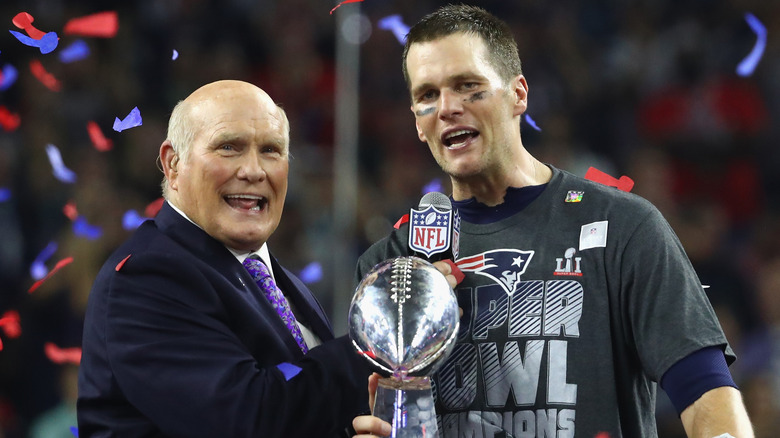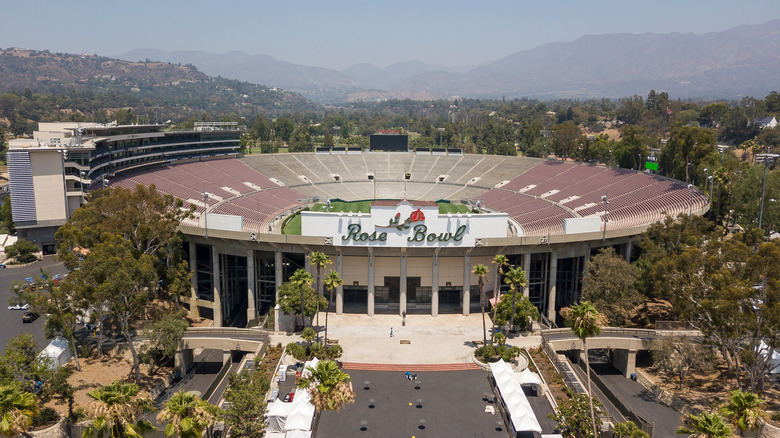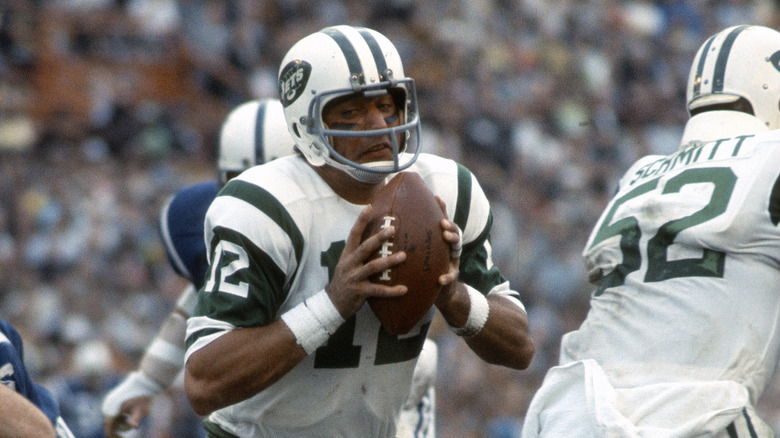This Is Why Football Championships Are Called Bowls
Professional basketball has the NBA Finals. Major League Baseball has the World Series. The NHL has the Stanley Cup Finals. And over in the world of American football, college teams have various bowl games that make up the College Football Playoff, while the NFL has the Super Bowl, as well as its annual all-star game, the Pro Bowl. What's with the word "bowl" and how come it's been used for several decades as a term for college and professional football championships or postseason games?
It's understandable to assume that "bowl" is used as a more symbolic and colorful way to an important game or title, rather than simply calling it the "Big Game" or something similarly banal or generic-sounding. You can perhaps name these things after people who made significant contributions to the sport, such as Vince Lombardi, for instance. But while the NFL's champion in any given season gets the trophy named after the legendary coach, the title game is still known as the Super Bowl.
The usage of "bowl" in the lexicon of football actually has a long and interesting history, one that dates back all the way to the early 20th century. And it all started with the game that has since been dubbed the "Granddaddy of them All" — the Rose Bowl.
The Rose Bowl's name inspired others to follow suit
Before the word "bowl" was ever used to refer to football championships or championship/playoff games, the Tournament of Roses Association held the first-ever postseason contest in the sport's history, where Michigan dominated Stanford, 49-0, on January 1, 1902, at Tournament Park in Pasadena, California. Given that the game was an utter blowout, football was immediately phased out and replaced with good old-fashioned chariot races — the Tournament of Roses website specifically describes them as being reminiscent of those depicted in the 1880 novel "Ben-Hur: A Tale of the Christ."
It wasn't until 1916 when football returned to the Tournament of Roses' schedule of events, and with attendance figures for these games steadily rising, architect Myron Hunt was enlisted to design a new stadium for the annual contest (via Today I Found Out). Hunt drew inspiration from Yale's football stadium, the Yale Bowl, and by 1923, his now-finished creation was aptly named the Rose Bowl. Not long after, the championship game was named after the stadium, and other organizations — cities and colleges with their own football teams — started using the word "bowl" at the end of their postseason games, despite how many of them did not actually have a bowl-shaped stadium like Pasadena's Rose Bowl.
Pro football started using the term in the early '50s
Considering how professional football was a red-headed stepchild in comparison to college football during the first few decades of the 20th century, it wasn't until the early 1950s that the NFL took heed and started using the word "bowl" to refer to big games — though not necessarily championship contests just yet. The NFL had been holding all-star games since 1938, but instead of pitting the best players from each conference against each other, these games involved the league champions facing a fan-voted selection of players from other teams.
By 1950, with the NFL quickly soaring in popularity, league commissioner Bert Bell authorized the use of the name "Pro Bowl," with the first such game under this new branding taking place on January 14, 1951, per Pro Football Reference. With the new name came the now-familiar format of two all-star teams, usually one from each conference, battling each other on the field.
Likewise, the NFL had a championship game for multiple decades prior to the birth of the Super Bowl, but back in the Super Bowl's earliest years, it was known as the "AFL-NFL World Championship Game," according to Today I Found Out. Needless to say, that didn't exactly roll off the tongue, but it was essentially a placeholder name to be used while the NFL's merger with the upstart American Football League was being finalized. The Super Bowl name only became official ahead of the third such game in January 1969 — right on time for New York Jets quarterback Joe Namath to make good on his famous guarantee that his AFL team was going to beat the NFL's Baltimore Colts.


